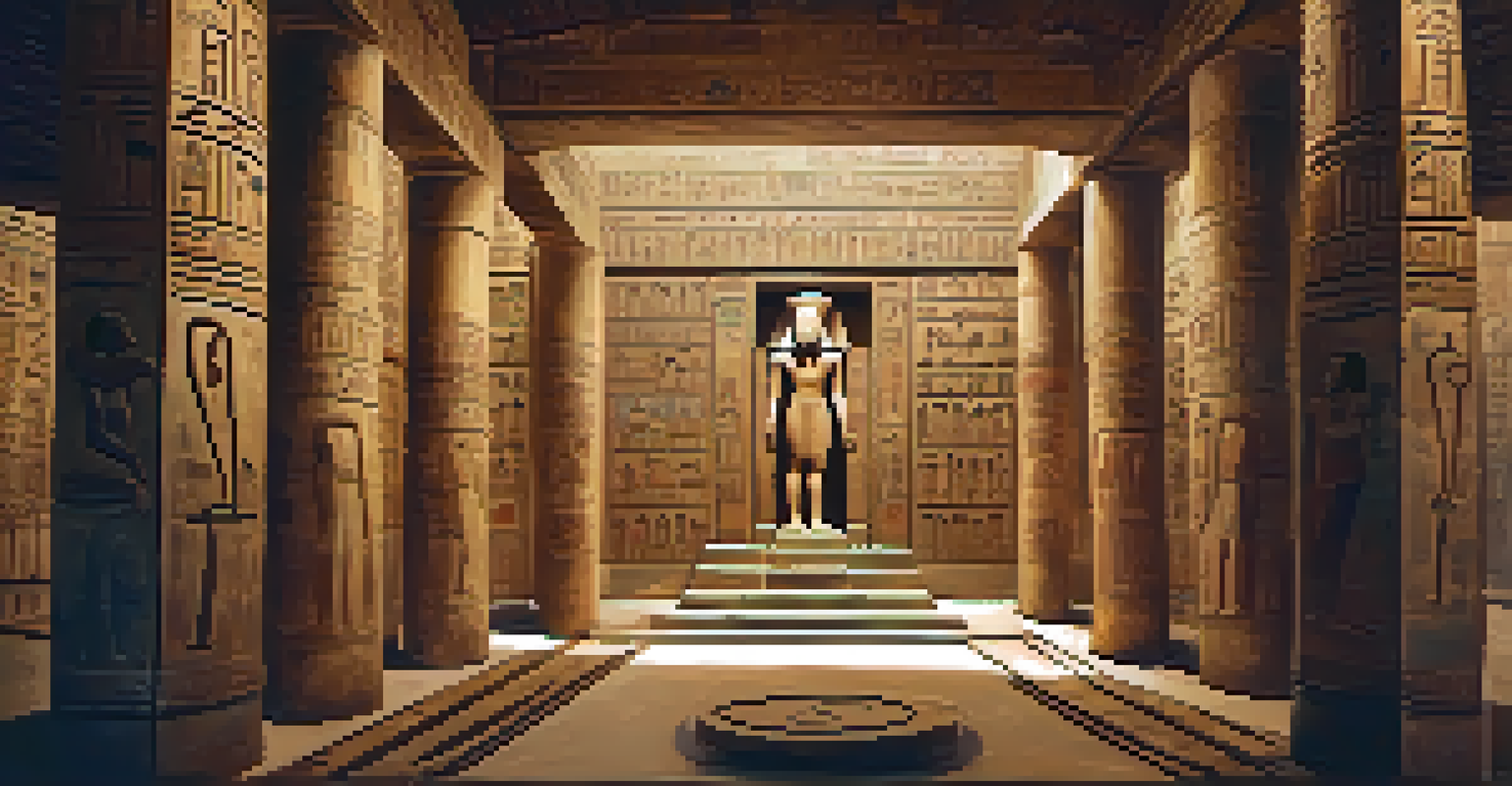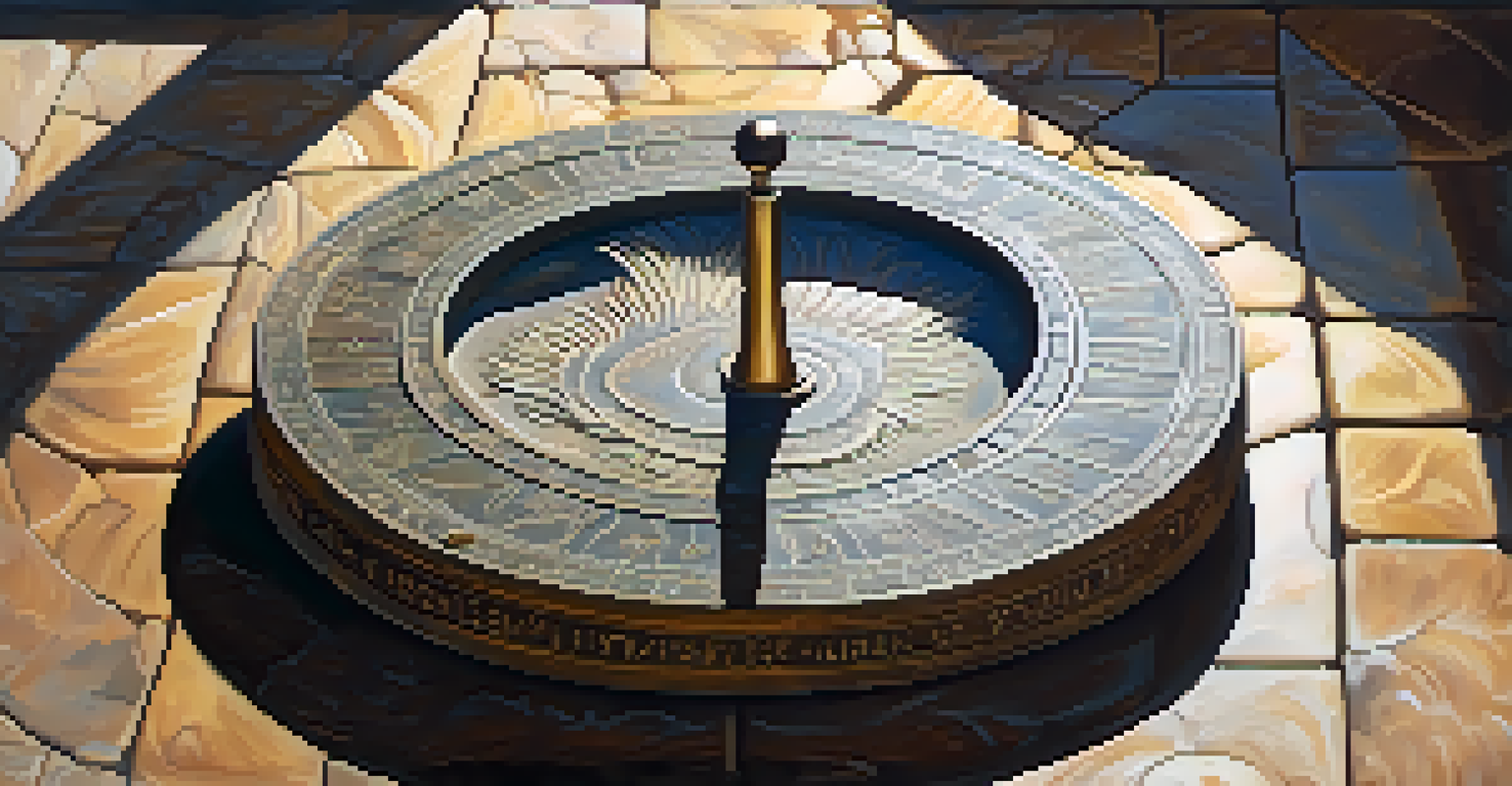Perception of Time in Ancient Egyptian Spirituality

The Concept of Time in Ancient Egypt
In Ancient Egypt, time was not just a measurement; it was a vital aspect of their spirituality. The Egyptians viewed time as cyclical rather than linear, which meant they believed in endless cycles of life, death, and rebirth. This perspective shaped their religious practices and understanding of the universe, where every moment echoed past events and anticipated future occurrences.
Time is a created thing. To say 'I don't have time,' is like saying, 'I don't want to.'
Their calendar was intricately tied to the agricultural cycles, influencing planting and harvesting seasons. The annual flooding of the Nile, a critical event for agriculture, reinforced their cyclical understanding of time. This connection between natural phenomena and time gave rise to celebrations and rituals that honored these cycles.
Moreover, they divided time into smaller segments, such as hours and days, but these divisions were often intertwined with their mythology. Deities like Ra, the sun god, embodied time itself, symbolizing the daily cycle of rising and setting. Thus, the Egyptians viewed time as both a practical tool and a profound spiritual concept.
Mythological Influences on Time Perception
Ancient Egyptian mythology played a crucial role in shaping their perception of time. The myth of Osiris, for example, illustrates the themes of death and resurrection, emphasizing the cyclical nature of existence. This mythological framework provided a narrative that influenced how they understood the passage of time and the afterlife.

The Egyptians believed that the journey of the soul after death was also bound by time, navigating through the Duat, the underworld. This journey was seen as a series of events that the soul would experience, emphasizing the importance of preparation and rituals performed during one's lifetime. Each moment was significant, as it contributed to the soul's fate in the afterlife.
Cyclical Time and Spirituality
Ancient Egyptians viewed time as cyclical, intertwining their spiritual beliefs with natural cycles of life, death, and rebirth.
Additionally, the gods and goddesses representing various time aspects, such as Hathor and Thoth, were integral to their spiritual practices. These deities were invoked in rituals to ensure harmony with the cosmos, reinforcing the belief that time was sacred and must be respected. Their stories and representations became a framework for understanding the significance of time in everyday life.
Time Measurement and Calendrical Systems
The Ancient Egyptians developed sophisticated means of measuring time, which were crucial for their agricultural society. They utilized a solar calendar consisting of 365 days, divided into twelve months of thirty days, plus an additional five 'epagomenal' days. This system not only helped them track time but also aligned their rituals with the seasons.
The past is never dead. It's not even past.
Additionally, they had a lunar calendar for religious purposes, tracking the months based on the moon's phases. This dual approach to timekeeping allowed them to synchronize their agricultural activities with spiritual observances, creating a harmonious balance between the physical and the divine.
The invention of sundials and water clocks further demonstrated their commitment to understanding and measuring time. These innovations enabled them to segment the day into hours, enhancing their daily life and spiritual practices. Time, thus, became an essential aspect of both their practical existence and their spiritual beliefs.
Rituals and Time: A Spiritual Connection
Rituals in Ancient Egypt were intricately tied to their understanding of time, serving to connect the present with the divine. Specific ceremonies were scheduled to align with significant astronomical events, such as solstices and equinoxes, reinforcing the idea that time was a bridge between humanity and the gods. These rituals were often seen as a way to maintain cosmic order.
For instance, the Opet Festival celebrated the annual flooding of the Nile, marking the beginning of the agricultural season. This event was not only a practical necessity but also a spiritual celebration, underscoring the importance of time in their agrarian culture. The rituals performed during such festivals were believed to renew the relationship between the pharaoh, the people, and the deities.
Rituals Align with Time
Rituals in Ancient Egypt were scheduled around significant astronomical events, connecting the present to the divine and reinforcing cosmic order.
Moreover, the timing of funerary practices was crucial in ensuring a safe passage to the afterlife. The Egyptians meticulously prepared for death, believing that the timing of these rituals could affect the deceased's journey. This deep connection between time and spirituality highlights the role of rituals in navigating the complexities of existence.
The Afterlife and Timelessness
In Ancient Egyptian belief, the afterlife was a timeless realm where the soul existed beyond the constraints of earthly time. This concept of timelessness was essential in reassuring individuals that life continued after death, albeit in a different form. The notion that time ceased to exist in the afterlife offered comfort and hope to the living.
The 'Field of Reeds,' the paradise where souls resided, was seen as an ideal continuation of life without the limitations of time. In this eternal space, individuals could enjoy the fruits of their labor without fear of aging or decay. This belief system significantly impacted how they approached life, emphasizing the importance of living virtuously.
Additionally, the practices surrounding mummification and tomb construction were designed to ensure the deceased's comfort in this timeless existence. By preserving the body and providing necessary goods for the afterlife, the Egyptians believed they were transcending time itself, creating a lasting legacy. Thus, their understanding of time was deeply intertwined with their views on immortality.
Symbolism of Time in Art and Architecture
Art and architecture in Ancient Egypt often reflected their unique perception of time. Temples and tombs were not only physical structures but also symbolic representations of eternity. The intricate carvings and hieroglyphs often depicted scenes of time, such as the cyclical nature of seasons or the journey of the sun across the sky, reinforcing their beliefs.
For example, the Great Pyramid of Giza, aligned with the cardinal points, symbolized the Egyptians' desire for immortality and their connection to the cosmos. The pyramid itself was a testament to their understanding of time, serving as a monumental structure intended to last through ages, bridging the earthly realm and the divine.
Timelessness in the Afterlife
The belief in a timeless afterlife offered comfort, influencing how Egyptians approached life and death through practices like mummification.
Moreover, wall paintings often illustrated moments in time, encapsulating significant events and rituals that held meaning for the deceased. These artistic expressions served as a reminder of the cyclical nature of life and death, intertwining the physical with the spiritual. Through art and architecture, the Egyptians communicated their complex understanding of time to future generations.
Conclusion: The Lasting Legacy of Time Perception
The Ancient Egyptian perception of time offers profound insights into their spirituality and daily life. Their cyclical understanding of time, influenced by mythology, rituals, and practical needs, created a rich tapestry of beliefs that shaped their culture. This enduring legacy continues to fascinate scholars and enthusiasts alike, revealing the depth of their spiritual philosophy.
As we explore their world, we see how time was not just a measurement but a critical aspect of existence intertwined with their understanding of life and death. The Egyptians’ respect for time and its spiritual significance reminds us to consider how we perceive our own time today.

Ultimately, the Ancient Egyptians teach us that time, while measured in hours and days, is also about moments that connect us to one another and the universe. By reflecting on their beliefs, we can gain a deeper appreciation for the intricate relationship between time and spirituality in our lives.